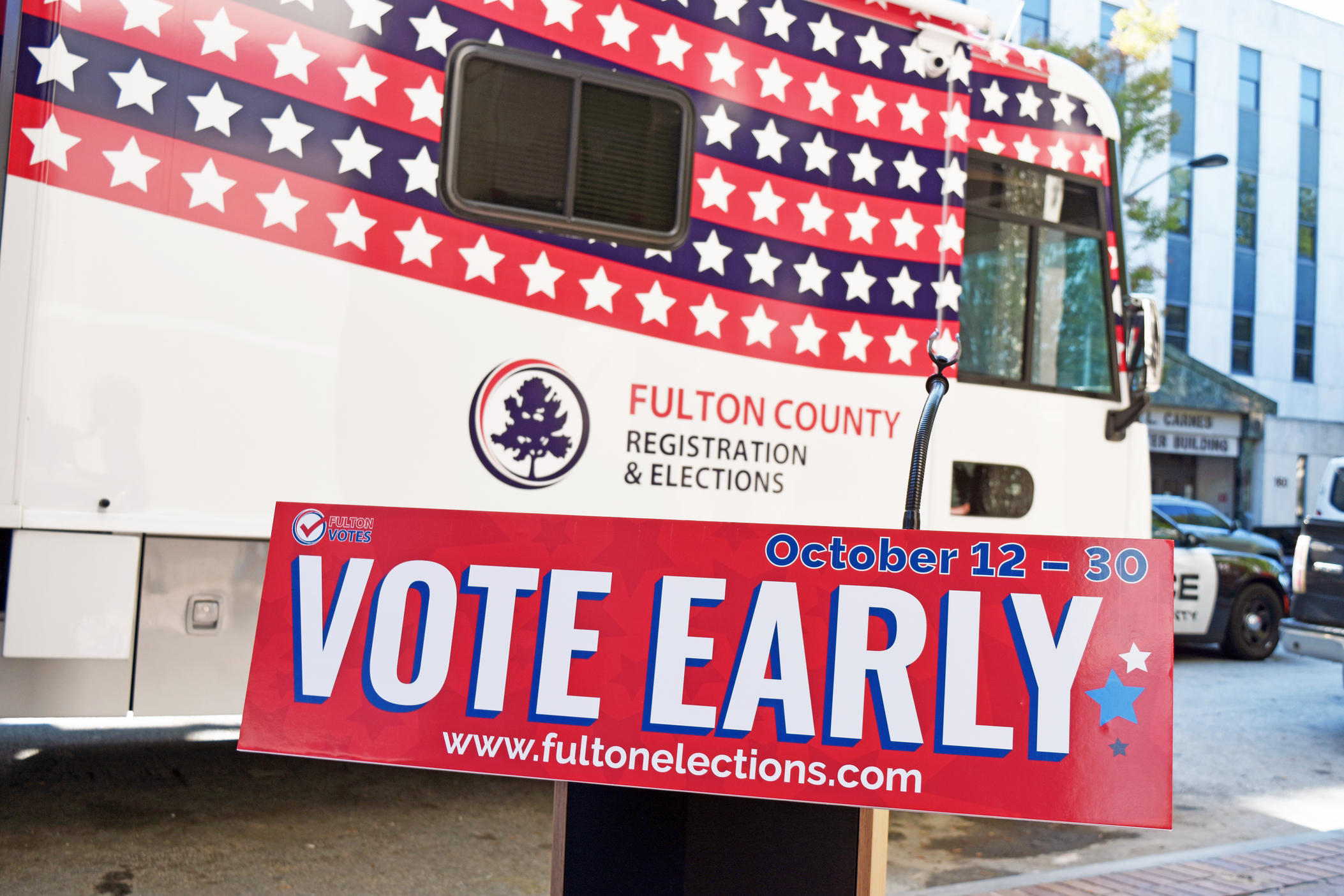Section Branding
Header Content
Battleground: Ballot Box | Let's Make A Voting Plan
Primary Content
On this episode of "Battleground: Ballot Box," we discuss the importance of making a voting plan, whether you plan to cast your ballot by mail, early in person or on Election Day.
Mail voting is underway, with about a quarter million ballots already returned. Monday, Oct. 12, starts three weeks of early voting (including one required Saturday, Oct. 24) and Election Day is Nov. 3.
Aklima Khondoker is the state director for All Voting is Local, which, like the name suggests, focuses on helping voters participate in the electoral process at the local level.
"We are focusing on uplifting voters, on giving them critical information that they need, but also working with policymakers, working with government officials, working with everyone to make sure that voters have the critical information on their ballot," she said.
Her group is part of the Leadership Conference for Civil and Human Rights and Leadership Conference Education Fund, and is one of many organizations that are there to help people get through the voting process and deal with barriers to the ballot — and to overcome fear and frustration with those barriers.
"It makes sense for you to hear what's going on and feel disheartened and discouraged, so I don't want anybody to feel like there's some idea that maybe it's unreasonable for them to feel that concern," she said. "But I also want people to know that they are empowered, because they still have their right to vote and they still have the power and options to access that right through the systems that are already in place in Georgia."
But Khondoker said it is important to not sugarcoat the voting process, which is not always easy for everyone.
Any registered voter in Georgia can vote absentee by mail, which is probably a new phenomenon for most Georgians. In the June primary, a sizable number of voters reported problems with the absentee voting process, either not receiving their ballot or getting it too late to use for the election.
"Understandably, there are some kinks within these systems — no one saying that there isn't," Khondoker said. "But we do have a number of ways that we can check into and make sure that our absentee ballots were requested properly and that they're going to be received in time."
There are some online tools to help, such as a new online absentee ballot request portal, a tracker for that absentee ballot and the most important: your My Voter Page that shows when the ballot has been accepted.
It is also important to request and return your ballot early, allowing extra time if you return it in the mail. Other options include returning the ballot in a secure drop box or hand-delivering it to your county elections office.
Speaking of your local elections officials, Khondoker wants you to also know that many problems with voting can be prevented by making one new friend.
"I would urge everybody to have a very close relationship with their counties as they would, let's say, with their utilities," she said. "If you have an issue in your home, what are you going to do? I'm going to figure out how to fix this issue because I have the right to that utility. Well, as a Georgia voter, you have a right to your democracy and you have a right to your ballot, your right to your vote. How do you do that? You have that one-to-one relationship with your county."
From confirming your voter registration status, to ensuring you have identified the right polling places or just answering general questions you may have, your local elections office is the best resource for you.
There are some other online tools that are helpful there as well, such as a voter registration portal, and the My Voter Page that has your address, assigned polling place, what districts you live in and a sample ballot.
Khondoker says it’s important to take the time now to make your plan and focus on those action steps to vote, and not let fear or misinformation creep into such an important part of democracy.
"That right to vote, it is yours... it is a part of how our democracy works, how your citizenship in this country works," she said. "So be proactive, use our online tools that are in place, but don't be afraid to check in with your county at each and every turn."
For example, say you want to vote early. Khondoker says that’s a great idea that benefits not only you but also other voters by having one fewer person that could show up at your polling place. She likens early voting to getting a sneak peek at a new movie that opens for everyone on Election Day.
"What we've seen on June 9 and other elections is that we have a lot of long lines because that is the day that is kind of the opening, so to speak; that's the premiere to our democracy," she said. "But what we do have are sneak previews — and we could think of that as early voting."
Voting early means shorter lines, less hassle and also more time to make the plan of when and how you will cast your ballot.
In Georgia, early voting begins Oct. 12 and runs through Oct. 30, including one mandatory Saturday, Oct. 24. Every county has at least one early voting location and Fulton, Georgia’s most populous, has 30. You can find them online.
But not everyone has access to the internet, so Khondoker says that relationship with your county comes in handy if you call or visit in person.
“Counties still have that information available,” she said. So please be proactive in taking those steps to do that, because the more that you know, the better your voting will go.”
If you still want that in-person Election Day voting experience, planning is still important.
“You own Nov. 3 by being vigilant and proactive, and you do that by checking where your polling place is," Khondoker said. "Show up as early as you can to the polls, understanding that they are slated to open up at 7:00 a.m., slated to close at 7:00 p.m."
Many polling places have either moved, or been added in the wake of the coronavirus pandemic, so even if you’re sure you know where you’re voting, double check before you leave.
And remember that no election is perfect, no polling place runs smoothly but, in Khondoker’s metaphor, the show must go on and will be smoother if you’re prepared.
“Understanding that, yes, we've seen the long lines, we've also heard about locations opening late, about locations staying open later because issues have required them to stay open later," she said. "These are facts, but these aren't necessarily bad facts, though. I think that we can arm ourselves with this information so that we would do better to be better prepared.”
It may sound like there is repetition here: harping on you to make a plan, check your locations and information and vote as early as possible — and there is.
There are more than 7 million registered voters in Georgia, 2,600 polling places, 159 counties and, ultimately, one person’s actions you can control. The voting landscape can be confusing, last-minute polling place changes can be frustrating and human error from poll workers can be downright disheartening when it comes time to cast your ballot.
But through this podcast, we want you to feel empowered about your vote and your voice for this election, and all the ones to come.
What is your voting plan going to be for this election? Tell your friends and family — work with them to have one, too, and we can all rest a little easier tonight knowing that task is done.
If you have any questions, concerns or just want to share your voting plan, we’d love to hear from you — send me, Stephen Fowler, a note on social media or email.
Battleground: Ballot Box is a production of Georgia Public Broadcasting. You can subscribe to our show gpb.org/battleground or anywhere you get podcasts.
Please leave us a rating and review on Apple Podcasts. Our editor is Wayne Drash, our intern is Eva Rothenberg, our show is mixed by Jesse Nighswonger and the director of podcasting is Sean Powers.



